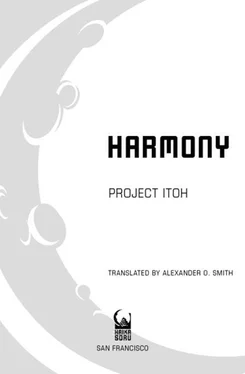Itoh, Project - Harmony
Здесь есть возможность читать онлайн «Itoh, Project - Harmony» весь текст электронной книги совершенно бесплатно (целиком полную версию без сокращений). В некоторых случаях можно слушать аудио, скачать через торрент в формате fb2 и присутствует краткое содержание. Год выпуска: 2010, Издательство: Haikasoru/VIZ Media, Жанр: Старинная литература, на английском языке. Описание произведения, (предисловие) а так же отзывы посетителей доступны на портале библиотеки ЛибКат.
- Название:Harmony
- Автор:
- Издательство:Haikasoru/VIZ Media
- Жанр:
- Год:2010
- ISBN:нет данных
- Рейтинг книги:4.33 / 5. Голосов: 3
-
Избранное:Добавить в избранное
- Отзывы:
-
Ваша оценка:
- 80
- 1
- 2
- 3
- 4
- 5
Harmony: краткое содержание, описание и аннотация
Предлагаем к чтению аннотацию, описание, краткое содержание или предисловие (зависит от того, что написал сам автор книги «Harmony»). Если вы не нашли необходимую информацию о книге — напишите в комментариях, мы постараемся отыскать её.
Harmony — читать онлайн бесплатно полную книгу (весь текст) целиком
Ниже представлен текст книги, разбитый по страницам. Система сохранения места последней прочитанной страницы, позволяет с удобством читать онлайн бесплатно книгу «Harmony», без необходимости каждый раз заново искать на чём Вы остановились. Поставьте закладку, и сможете в любой момент перейти на страницу, на которой закончили чтение.
Интервал:
Закладка:
Planning out someone’s daily life.
Planning out someone’s life.
It wouldn’t surprise me if Ichiro Tokume himself were following a life design given him by some other health consultant. That was how you lived in our postconsumer society.
Now this life planner was deftly working his fingers, holding the rope up where he could see it, and tying a knot to make a loop. Somehow, I didn’t think what he was doing had anything to do with his hormonal balance or GTP or any of that.
Next he walked into the kitchen where he found a small stool—probably something his wife stood on when she needed to reach the top cupboards. I watched him pick it up and return to the living room where he had been tying his rope. There he stood on the stool and began looping the other end of the rope around a light fixture in the middle of the ceiling.
Again his field of vision lowered as he stepped down and began to walk through the house toward the bathroom. ( I wonder what he’s up to? ) I watched him turn on the water, then everything went dark as he closed his eyelids. ( He’s washing his face. ) When he next opened his eyes, Ichiro Tokume was wiping his face with a towel. I caught a glimpse of his expression in the mirror for only a moment.
Not a trace of emotion.
Empty eyes, open mouth. Three empty holes.
Back to the living room. The noose was swaying gently from the ceiling. As he stepped up onto the stool he looked down at his feet, then back up. The noose encircled my field of vision and then was gone, around Ichiro Tokume’s neck. My field of vision shook violently.
Now we were swaying back and forth, looking out at the living room interior. A soft-pink sofa. A screen on one wall. Intelligent wall material made to look like plaster. We turned a full circle around the pivot of the rope, as though Ichiro wanted me to see where he lived with his wife. Everything was recorded.
Come in, come see my home!
This is the living room. This is where I hang myself.
Of course, I was merely watching what his AR contact lenses had recorded. Ichiro Tokume, age thirty-eight, had expired when the full weight of his body had pulled at the vertebrae in his neck. If I’d wanted to, I could have watched the feed until his body stopped providing its electrical current to the lenses and it went dark—a nice natural stopping point to the record of his last few minutes on earth.
First-person POV suicide flicks.
Of the 6,582 cases, 2,049 had been wearing AR contact lenses when they did the deed. The last things they saw remained on the server, giving us close-up front-row seats to their deaths.
AR contacts monitor focus points, and I wanted to see what Ichiro Tokume had been looking at. A cursor blipped around the screen, highlighting wherever his eyes went. The objects and angle of view were then listed up and run through several formulas to analyze Mr. Tokume’s mental state in the ten minutes leading up to lights out. The results, displayed in bold on another screen, were nothing surprising.
Severe depressive tendencies.
Suicidal tendencies.
I decided to watch a hundred more similar movies at 3x speed. Each was about twelve minutes long. Divided by three times one hundred equaled four hundred minutes.
I plugged in the commands and sat back, for just under seven hours, to watch the deaths of one hundred people randomly selected from 2,049, back to back.
My database of suicide movies.
I couldn’t imagine anything other than a mass, unexplained suicide requiring the creation of such a morbid collection.
Each person in the database had only ten minutes’ worth of footage, the reason being that all had taken action so swiftly. It was like each of them had parents who had told them to never put off for tomorrow what could be done today, and they listened. The logger in Canada had been cutting through a particularly large pine tree when he suddenly pulled out the chain saw and cut through his own neck. I watched his field of vision lurch, then fall until it was rolling across a bed of matted decaying leaves.
The scene changed to the next victim.
I was looking at my own face, from another time and place. My breath stopped.
Mirror, mirror, on the wall.
She had been among a random selection of a hundred victims.
I was staring at me. A dead person was staring at me.
I looked at myself, Tuan Kirie, through the eyes of my friend who, in a matter of minutes, would stick a table knife through her own throat and paint the walls of the restaurant with her blood.
My face. Skin tanned a little by the ultraviolet rays of the Sahara.
What a grotesque mirror.
The Italian restaurant on the sixty-second floor of the Lilac Hills building.
The field of vision went from my face down to the bright red and fresh white slices on her plate—the insalata we’d both ordered. I noticed everything was moving at normal speed and realized I must have flicked off the fast forward without even realizing it. The cursor told me Cian was focusing on the red slices of tomato and brilliant white slices of mozzarella layered atop them.
“I’m sorry, Miach.”
That was what Cian would be saying any second now.
I heard the words moments after anticipating them.
Cian’s attention shifted to the table mats, and I saw her healthy arm and hand, neither fat nor slim, slide into view. The hand grabbed the knife to the right of her dish, gripping the handle with the blade pointing down, while I stared. A waiter walked up to fill my glass of water—
I switched off the AR.
My lungs were screaming for air, my brain for oxygen. I had forgotten to start breathing again.
The sound of my heaving breaths filled the conference room of the WHO Japan branch I was using for my little viewing session.
Thankfully, I was alone in the room. I had been the only Helix agent in Japan when the event occurred, which was lucky for me. This way I wouldn’t be obliged to cooperate with any other agents.
Maybe I should go in for immediate therapy. Maybe I should go to some emergency morality center with white cotton walls to escape from the words that had spilled from Cian’s mouth.
Calm down. Steady breaths.
Don’t you want to find out why Cian died? Didn’t you blackmail your boss just for a chance to find out what your friend’s last words meant? So you saw yourself looking at your friend just before she died, so what? You’re breathing heavy just because you remembered a few words?
I’m sorry, Miach.
And then something occurred to me.
Of my one hundred randomly chosen victims, Cian had been the only one to say something as she died. Why was she the only one to leave last words? Were those even “last words,” as we like to think of them, or just something she happened to say? My selection had been truly random, and while it had been just a coincidence that Cian’s name was on the list, I found it hard to believe that the other ninety-nine people’s not saying anything before committing suicide, or even leaving a note, had also been a coincidence.
“Go through all the records and pull out just the ones containing the subject’s voice,” I told the database. This got me a few results, all mundane snippets of daily conversation with family or friends, none of which seemed connected in any way to the optimal methods of suicide they were about to employ.
I’m sorry, Miach.
Which left Cian Reikado as the exception. The only one with something to say.
That something being the name of the girl who had died, leaving us cowardly deserters behind.
≡
I had returned to that place Miach called the “suburb of the soul.” Back to an endless, boring future of connected blocks, their nanomaterial plaster walls painted in light pastels.
Читать дальшеИнтервал:
Закладка:
Похожие книги на «Harmony»
Представляем Вашему вниманию похожие книги на «Harmony» списком для выбора. Мы отобрали схожую по названию и смыслу литературу в надежде предоставить читателям больше вариантов отыскать новые, интересные, ещё непрочитанные произведения.
Обсуждение, отзывы о книге «Harmony» и просто собственные мнения читателей. Оставьте ваши комментарии, напишите, что Вы думаете о произведении, его смысле или главных героях. Укажите что конкретно понравилось, а что нет, и почему Вы так считаете.












